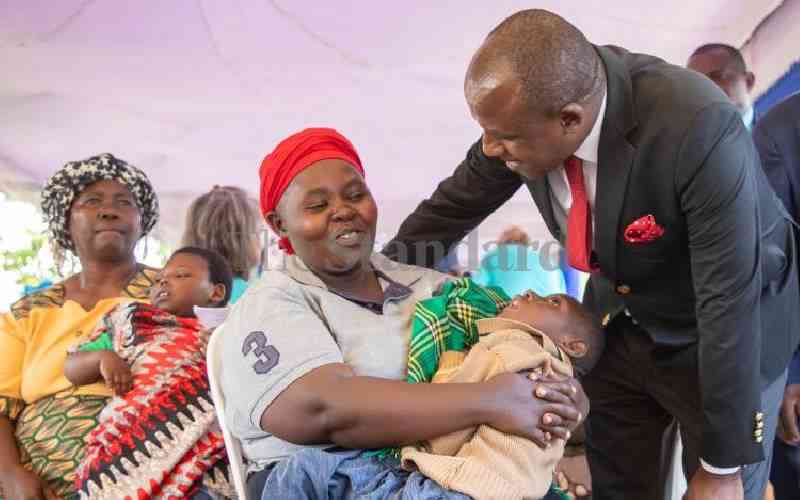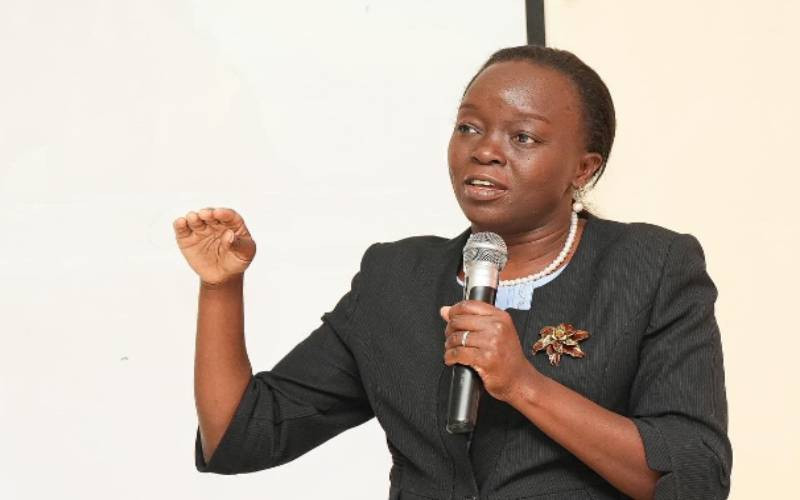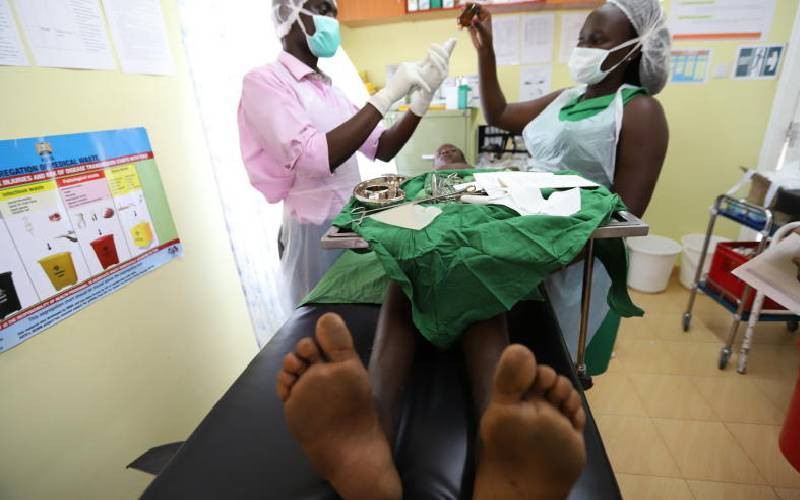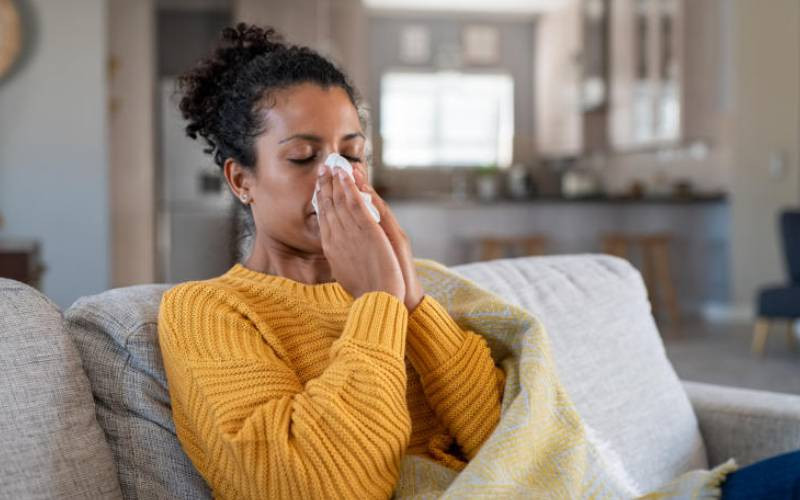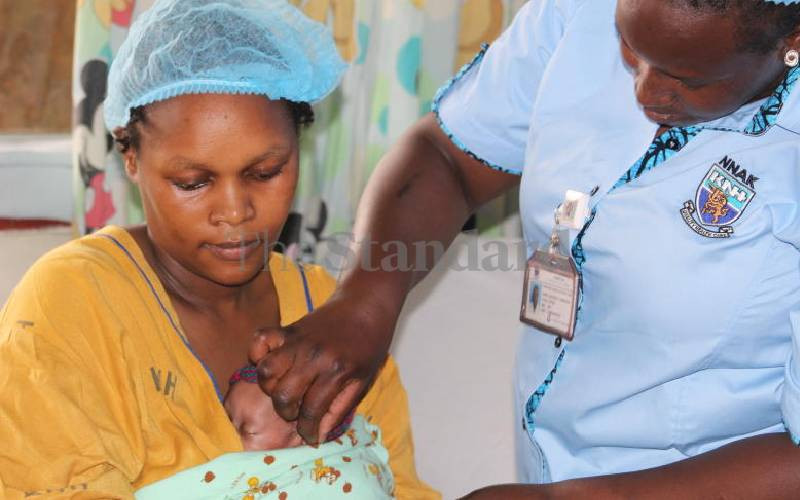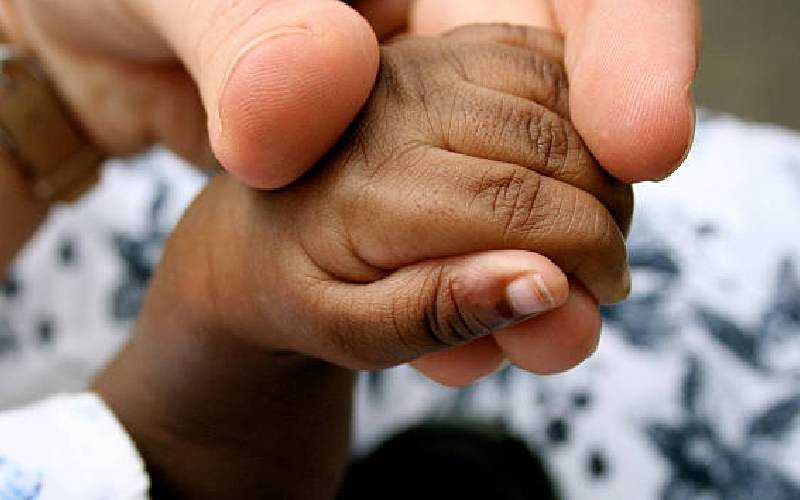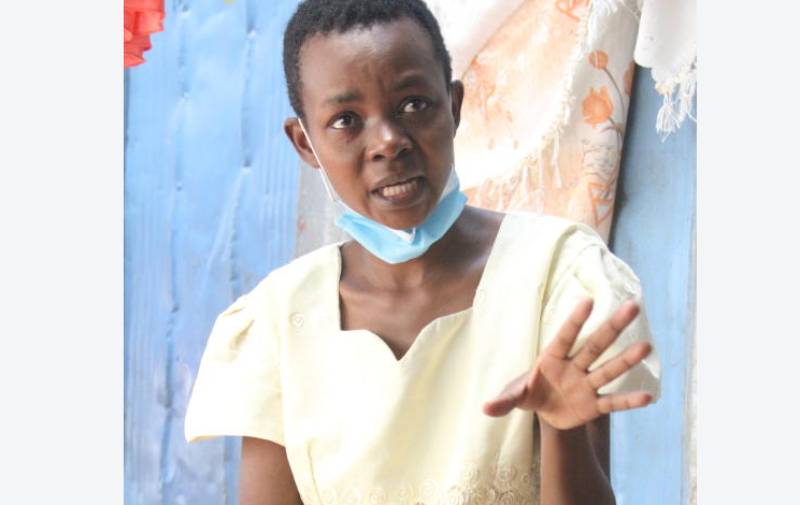
Juliet Mutuku who is on Palliative Care yesterday during an interview at her home in Mukuru Kwa Njenga, Nairobi. [David Njaaga, Standard]
Inside a room marked nine, a fading figure inscribed on the door of a tiny single-roomed house in Mukuru Kwa Njenga slum, is a woman facing the hardest decision of her life. She is battling cervical cancer and has no close family to take care of her. The disease is spreading fast and she can barely afford the Sh1,000 morphine needed to contain her pain.
Juliet Mutuku recounts many nights when the pain got so intense that she could barely move. A specific night haunts her. It happened a few weeks ago. She was bathed in sweat, shivering and crying for help.
All her three little children woke up to hold her, and together they helplessly cried. The pain incidents have been many in the last few days, so she is doing something she says a mother should never have to do.
“I am giving my children away. I am ready for them to go anywhere where they can get the best education. Having them here torments me. I cannot work to give them anything, and I hate how they cry when I am in pain,” she says, her voice coming out in urgent gasps. Then her tears flow and she does not attempt to wipe them.
“For this disease, I have cried. Every day. I cry when I think of my children because I am all they have,” she says.
Before cancer took hold, she was the sole provider for her children aged between 11 and six. She worked two jobs, as a chicken vendor who pushed a handcart around the vast Mukuru slum to deliver chicken to butcheries, and on other days, she was employed as a driver.
In their single-roomed house partitioned by net curtains, she checked her children’s homework and tucked them in the bed they all shared. They did not have much, but she says they were happy. She had dreams, to grow her business and move to a bigger house. Her greatest desire was to see her children graduate from college and breaking the cycle of poverty she had been born in.
Her mother died when she was in nursery school. She went to live with her grandmother, and it marked the end of her education.
“I wanted a different life for my children. I am suffering like this because I did not go to school. I had sworn it would never happen to my children. Now cancer has come, and plans must change,” she says amidst tears. Things changed when she was diagnosed with cervical cancer in late 2019. Last year, she went for treatment intermittently; only when she could afford it.
“With coronavirus, things became even more difficult because of job losses,” she says.
Together with Nairobi Hospice, Children's office and social workers, they are exploring options that would place the children in a safe place, without causing them emotional distress. The best they could do under the circumstance was to take them to a care home.
“I do not worry that I will be lonely when they leave. I cannot have them here when I have nothing,” she says.
A sob rocks her weak frame and she clings on the walking stick she has been using to walk. She stares absentmindedly at the many locked iron sheet houses that make up her neighbourhood, sighs, and says:
“I do not know where this disease will lead me. My biggest worry is, will my children be okay?” she says.
It is the little things, she adds, like her children having access to electricity to read, and having someone who can check their homework, that is pushing her to give her children away.
Angeline Kamene, a neighbour who has been helping them with housework describes the situation as extremely devastating.
“There are days when she cannot step out of bed, so we have to take turns to ensure they have food and her children are taken care of,” she says.
St Mary’s Catholic Church Mukuru, through their community fellowship, has been donating food for her children, but Kamene says it's not sustainable.
“There was a day she urgently needed blood donation. She was alone. She sent a message on Whatsapp; she was in a bad state. It breaks your heart to watch her struggle,” says Kamene.
Mercy Kamau, a palliative care nurse with Nairobi hospice says when the patient was referred to them by Kenyatta National Hospital, she had undergone rounds of chemotherapy, but still had health complications. She could not afford the many visits to the clinic and had even missed some of the chemotherapy sessions when she did not have money for a dose.
“It is one of the saddest situations I have handled. Every time we make home visits, she talks about her children and what the future holds,” says Kamau.
Rosemary Mutua, a Child Protection volunteer at Embakasi South says the worry is that predators might notice that the children spend most of their time alone with a sick mother, and abuse them.
“The case is sad and very urgent. Something must be done,” she says.
Throughout the process of getting official documents to move the children to a care institution, there were so many tears. From a mother who said it was a bittersweet moment for her; the joy of knowing that the burden of worrying about the children has been removed…yet there is the nudging anxiety of what will happen on the first night her children sleep in a home away from her.
“You have to make a choice for your children. The one you think will work best for them. If I get healed, I will take my children back,” she says, wiping her tears.
Risper Kige, the social worker who was in the middle facilitating the mother to obtain the paperwork from police, the children’s department, area chief says the pain of watching a mother surrender her children; and acknowledging that she is defeated is sad to watch.
Yesterday evening, Mutuku and her three children walked into the care home, marking a new beginning for all of them. She left them after a long embrace.
 The Standard Group Plc is a multi-media organization with investments in media platforms spanning newspaper print
operations, television, radio broadcasting, digital and online services. The Standard Group is recognized as a
leading multi-media house in Kenya with a key influence in matters of national and international interest.
The Standard Group Plc is a multi-media organization with investments in media platforms spanning newspaper print
operations, television, radio broadcasting, digital and online services. The Standard Group is recognized as a
leading multi-media house in Kenya with a key influence in matters of national and international interest.

